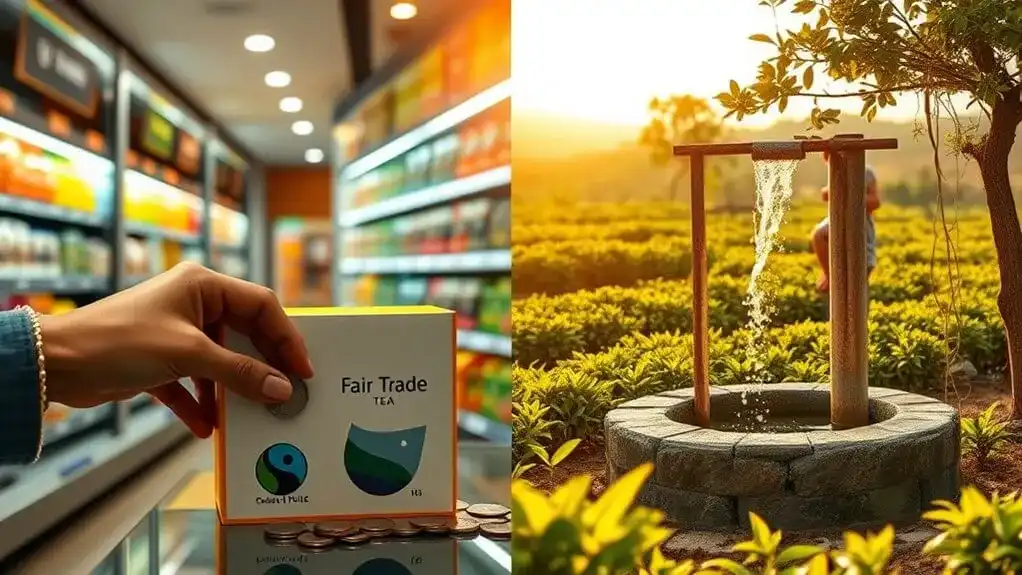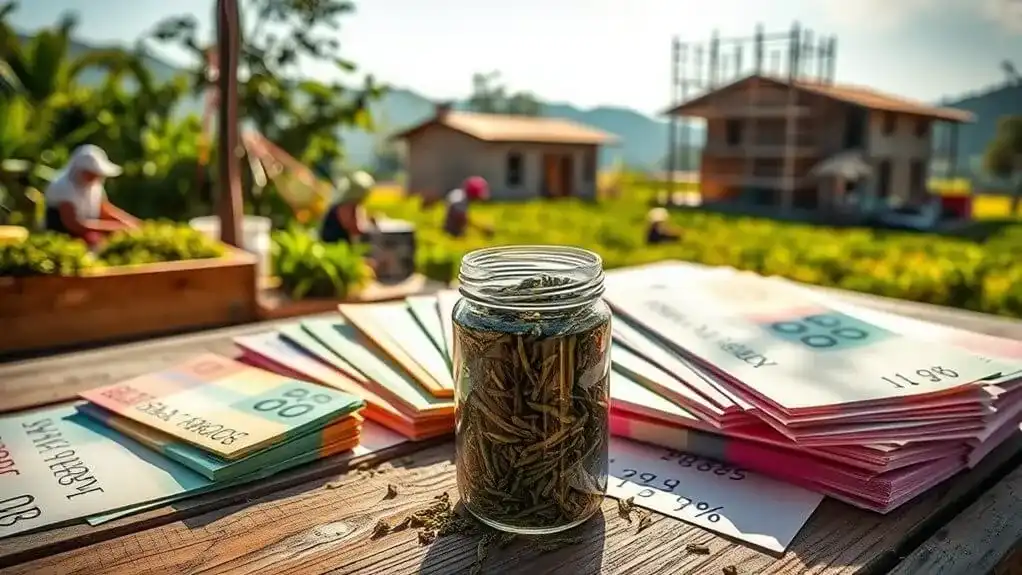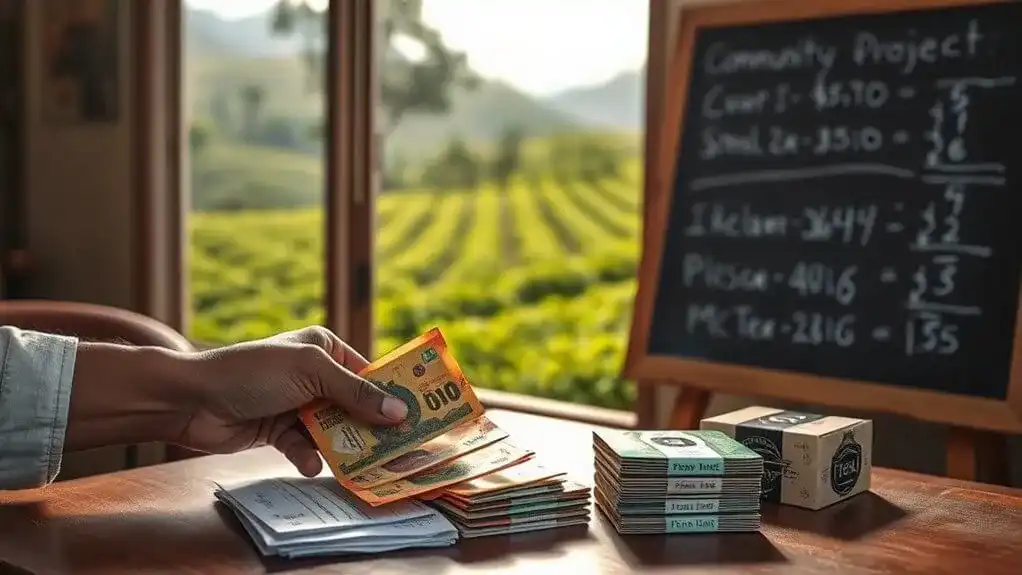Fair Trade tea premiums create a direct financial link between consumers and tea-growing communities. When consumers buy certified tea, they trigger a $0.50 premium per kilogram that flows into communal investment funds. These premiums, which generated £3.9 million in 2020, support essential community projects like schools, healthcare, and sustainable farming practices. Worker councils democratically manage the funds, ensuring local needs drive investments. Understanding this premium system reveals how everyday purchases transform distant communities.
Key Points
- Consumers trigger a $0.50 per kilogram premium on black tea sales, which gets collected by Fair Trade certification bodies.
- Premiums are pooled into communal funds, with producers receiving 15% for conventional and 10% for organic tea.
- Worker councils democratically manage premium distribution, investing up to 75% in social projects and 36% in farming practices.
- Funds support community services including healthcare, education, infrastructure, and women's empowerment initiatives across tea-growing regions.
- Premium usage is monitored by compliance committees, ensuring transparency and proper allocation of funds for community development.
Understanding the Fair Trade Tea Premium System

While conventional and organic instant teas follow different premium structures, the Fair Trade tea premium system operates as a percentage-based model that rewards sustainable production. Conventional instant tea producers receive a 15% premium on the commercial price, while organic producers earn 10%. This premium calculation reflects fair trade principles that support sustainable farming practices.
Unlike some other fair trade products, instant tea doesn't have a minimum price requirement. Instead, producers negotiate their commercial price directly, with the premium added afterward. The system undergoes price reviews every three to four years to account for local inflation, ensuring the premiums remain meaningful. All premiums flow into a communal fund, where democratically elected representatives decide how to invest the money in community development, education, health initiatives, and environmental projects. These funds have proven instrumental in ending exploitation, with over £166 million generated and reinvested in communities during 2018 alone.
The Premium's Journey: From Purchase to Producer

The journey of Fair Trade tea premiums begins when consumers purchase certified products, triggering a $0.50 per kilogram premium on black tea sales. Fair Trade certification bodies manage the premium collection process, ensuring funds reach certified producers, including small-scale farmers and tea estates. In Africa, most of these producers work on less than half of a football pitch of land.
Producer involvement is central to the premium's journey, as workers' councils democratically decide how to invest these funds in their communities. In 2020, tea producers earned £3.9 million in premiums, benefiting over 390,400 farmers and workers. These funds support various community initiatives, from healthcare and education to environmental sustainability projects. The establishment of 21 water stations has significantly improved access to safe drinking water in producer communities. Common investments include ambulances, school improvements, and sustainable farming practices. Through this system, Fair Trade premiums create lasting positive impacts on producer communities while promoting sustainable livelihoods.
Breaking Down Premium Allocation and Spending

Fair Trade premium allocation follows distinct patterns across different product categories, with tea producers receiving $0.50 per kilogram compared to cocoa farmers' $200 per tonne. The premium distribution varies by region and product, with the global Premium reaching €210 million for top products in 2022. The total impact extends even further with over €12 million contributed by minor Fairtrade products.
Allocation transparency shows small-scale producers invest 36% of premiums in improving farming practices, while plantation workers direct 75% toward social investments like education and housing. Up to 20% can be spent on cash benefits, with flexibility increasing to 50% under revised guidelines. Producer organizations maintain democratic decision-making processes, with co-operatives and worker committees determining local spending priorities. Regular pricing reviews every three to four years guarantee premiums keep pace with inflation, benefiting over two million farmers and workers globally.
Community Impact and Social Investments

Investment in community development through Fairtrade Premiums has transformed tea-growing regions by funding essential services and infrastructure. Over 11% of premiums support crucial community services, from building schools and healthcare facilities to improving roads and water systems. The movement ensures safe working conditions for farmers across the globe. Numi Tea's ethical sourcing practices contribute directly to these development initiatives.
Community engagement drives sustainable practices through targeted social investments. Workers and their families benefit from extensive healthcare services, including maternity care and preventative measures like mosquito nets. Education remains a priority, with premiums funding scholarships and new schools, while economic empowerment initiatives provide trade skills development and leadership opportunities.
These investments align with key Sustainable Development Goals, addressing poverty, hunger, health, and education. Through fair wages, gender equality promotion, and improved working conditions, Fairtrade Premiums create lasting positive change in tea-growing communities.
Market Challenges and Premium Generation

Despite significant growth in fair trade tea production, small-scale farmers continue facing substantial market challenges, including price volatility and limited bargaining power against large corporations. The average African tea farm, smaller than half a football pitch, struggles with market access and unfavorable pricing strategies dominated by major companies. The elimination of supply chain intermediaries helps farmers retain more profit from their tea production.
To address these challenges, Fairtrade has implemented a premium of US$ 0.50 per kilogram on black tea sales. This initiative now benefits over 390,400 farmers and workers across 12 countries, generating £3.9 million in premiums during 2020. Ensuring transparency, compliance committees now oversee premium usage on plantations to enhance worker involvement. Workers invest 80% of these funds in services for their families, while 11% supports community development through housing, education, and healthcare improvements. However, critics argue the system still favors retailers over producers and excludes many poor farmers due to certification costs. Companies like Bird & Blend have opted to pay premium prices directly to producers instead of pursuing Fairtrade certification.
Building Sustainable Futures Through Premium Investment

Through strategic allocation of Fairtrade Premium funds, tea-producing communities are building pathways to long-term sustainability. The largest portion, 36%, goes toward improving production and farming practices, while 28% supports critical infrastructure development like processing plants and storage facilities.
Premium investment creates multiple layers of impact. Small producer organizations direct 40% of funds to farmer services, including training and capacity building. They're also investing 18% in agricultural tools and inputs, promoting sustainable agriculture practices. The benefits extend beyond farming, with 75% of plantation premiums supporting social initiatives like education and housing for workers and their families.
This thorough approach aligns with key Sustainable Development Goals, with 39% contributing to Zero Hunger and 21% supporting Decent Work and Economic Growth initiatives. The US$0.50 per kilogramme premium on black tea ensures a consistent flow of funds for these vital community investments.
Conclusion
Fair trade tea premiums continue transforming communities through targeted social investments, with over 82% of funds supporting education and healthcare initiatives. While market volatility affects premium generation, the system's transparent flow from consumer to producer guarantees meaningful impact. Tea-growing communities aren't just surviving – they're building sustainable futures through premium-funded projects that strengthen infrastructure, empower workers, and create lasting generational change.
